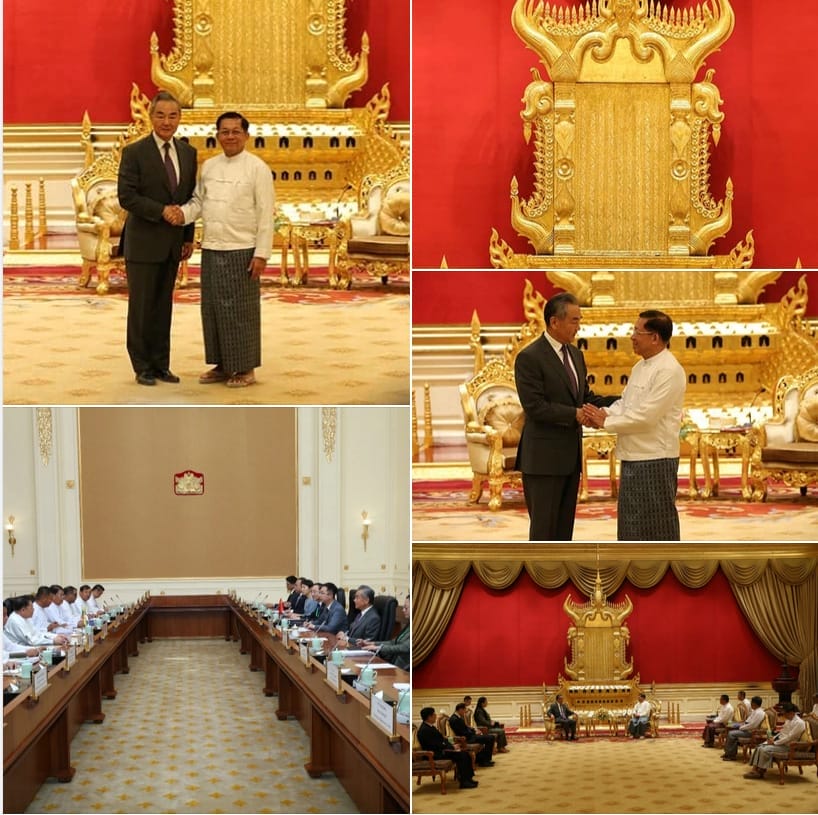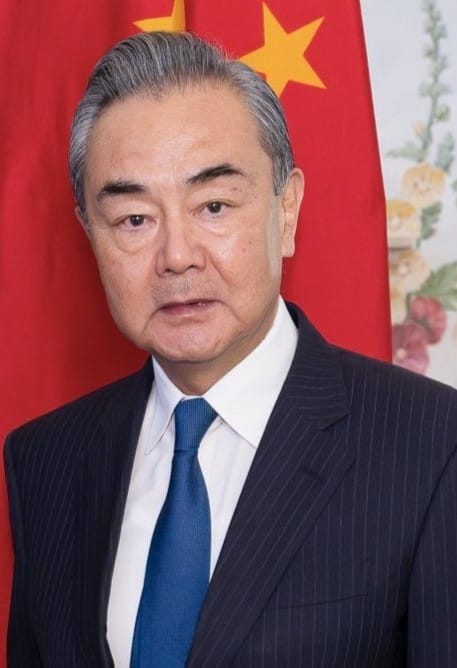Banner: Facebook page of the Chinese Embassy in Myanmar.
Amidst the worsening civil war in Myanmar, China has spoken loud and clear on its stance towards the troubled neighbour:
Beijing, in effect, continues to stand firmly with what Cambodia-chaired ASEAN Summit officially describes as “the largest military organization” of Myanmar.
Despite Wang Yi’s carefully worded diplomatic message designed to convey China-Myanmar bilateral relations as “friendship with all Myanmar peoples”, the political significance – and the immediate impact – of his official and public meetings with the embattled military, cannot be overstated.
Wang Yi held two separate meetings with the two junta heads, past and present, namely retired Senior General Than Shwe and his hand-picked successor as Commander-in-Chief, Senior General Min Aung Hlaing.
In practical terms, Beijing has shored up the standing of Min Aung Hlaing – who has been rumoured to be facing the prospects of a palace coup by his deputies supposedly upset with his failing Commandership – and, more importantly, elevated Myanmar armed forces politically as the most crucial central stakeholder in Myanmar’s external and internal affairs.
This is extremely important, specifically against Myanmar’s domestically popular view that the military, who has been losing vast territories and military outposts and command centres, cannot be a legitimate stakeholder. Besides, the Chinese leadership continues to view the political solutions via a fresh elections, with semblance of civilian rule, all anchored in the military’s 2008 Constitution.
China’s top diplomat and a member of the Polit Bureau Wang Yi is Chairman Xi’s right-hand on China’s foreign policy. The London School of Economics-educated Chinese Foreign Minister has gravitas which his American counterpart Anthony Blinken lacks in world affairs. It is safe to argue that Wang Yi’s words on Myanmar accurately reflect the official Chinese perspective – and stance on – Myanmar’s worsening internal strife.

Photos from the Facebook page of the Chinese Embassy in Myanmar.
As Zhao Jin, a Chinese expert on Myanmar from Beijing Foreign Studies University, and an official interpreter for the top Chinese leaders on visits to Myanmar, pointed out (in her Facebook post below), Wang Yi stressed “China’s opposition to Myanmar’s civil war”, a significant departure from the past stance of “hoping for a speedy restoration of peace”.
On the eve of Wang Yi’s much-anticipated trip to Naypyidaw, the Myanmar language social media exploded with all kinds of wild and wishful rumours. One rumour that caught my attention was this: Wang Yi was coming to Myanmar with an offer of a safe exit, or an asylum, for the widely despised head of the junta, namely the Commander-in-Chief Min Aung Hlaing. For Beijing has been said to be “unhappy” with whom the military journalist Anthony Davis, among other Myanmar watchers, characterised as “incompetent” junta head: incompetent to put down the nationwide armed revolt to end the 60-odd years of the military’s grip on the country.
 After all, Myanmar’s neighbourhoods have witnessed precedents of deeply unpopular autocrats, ending their abusive reigns, unceremoniously, by going into exile. In 1986, Philippines’ Ferdinand Marcos was rescued by then US President Ronald Reagan who arranged for the embattled American client (and family) to come to Hawaii as a safe exile to live – and die.
After all, Myanmar’s neighbourhoods have witnessed precedents of deeply unpopular autocrats, ending their abusive reigns, unceremoniously, by going into exile. In 1986, Philippines’ Ferdinand Marcos was rescued by then US President Ronald Reagan who arranged for the embattled American client (and family) to come to Hawaii as a safe exile to live – and die.
More recently, the now deposed Prime Minister of Bangladesh Sheik Hasina was flown on a Bangladesh air force helicopter to West Bengal, India, the country of her political patronage. Both Marcos and Sheik Hasina lost the loyal backing of the most important internal pillar of their autocracy: the armed forces of their respective countries.
To the deep disappointment of the expectant anti-junta Myanmar resistance, Wang Yi reaffirmed China’s support for the country’s armed forces while acknowledging Myanmar (military’s) solid support for One China Policy and Beijing’s core interests in international arena.
From Beijing’s perspective Myanmar with its long and porous borders with China is, for all intents and purposes, an integral component of China’s long-term geopolitical ambitions.
These ambitions are not confined to China’s energy security (for instance, the twin gas-and-oil pipeline – “a sovereign project” – which originates in Rakhine state with its genocide triangle for Myanmar military, Arakan Army and the common victim community of Rohingyas and snakes its way towards the southernmost Chinese province of Yunnan) but include building the truly global People’s Liberation Navy, which can easily access the Indian Ocean via Myanmar’s 1,000-mile long coastal regions, developing mega-transport infrastructure in Myanmar, overland economic corridors and hydropower and mineral extractive industries.
No anti-junta armed group of Myanmar would dare threatening any crucial Chinese project in Myanmar. Quite the opposite. Virtually all sizeable anti-junta groups are keen to be on friendly terms with Beijing by publicly and chronically reassuring the latter of their desire to protect China’s interests in Myanmar.
Still, the raging civil war in Myanmar is something that distracts China from focusing on furthering its developmental and geopolitical interests in and via Myanmar. With Wang Yi’s whirlwind visit to Naypyidaw, China seems to have ended its wait-and-see approach to the military contests among the country’s central armed forces currently headed by Min Aung Hlaing on the one hand, and the loose mix of anti-junta armed organizations, with their own sub-national territorial and political ambitions, as well as commercial agendas on the other.

Wang Yi has been serving as Director of the Chinese Communist Party Central Committee Foreign Affairs Commission Office since January 2023, and as Minister of Foreign Affairs of China since July 2023 (previously from 2013 to 2022). Wikipedia Commons
Indicative of the paramount importance which Myanmar junta attached to Wang Yi’s visit, Min Aung Hlaing received the visitor from Beijing in what symbolically is Myanmar’s “throne room” in Naypyidaw, and treated the latter as if Wang himself was the head of Chinese state, minus the gun salutes.
Students of Myanmar affairs would do well to remember the three fundamental things about the country’s military, institutionally. Myanmar analyses tend to be overly focused on personalities at the expense of understanding the institution and the officer corps that lead it.
First, the Burmese military has never put all their eggs in a single basket since inception. It is a deeply pragmatic organization hellbent on keeping itself at the centre of Myanmar state. It was created by the World War II Japanese Naval Intelligence with the approval of the Fascist Prime Minister General Togyo. It allowed itself to be reformed along the lines of the British Armed Forces, after having switched sides when the tide of the world war turned against its Fascist patron. It subsequently moved close to the United States Armed Forces while maintain its socialist economic path, striking partnerships with the likes of Yugoslavia and Eastern European states. To date Myanmar military has retained its solid ties with their institutional counterparts of Russian Federation, India, Bangladesh and Thailand.
Second, generations of Myanmar officer corps have seen their mother institution as the most important “birth-mate” of the post-colonial state in Myanmar. The incomparably far smaller and weaker military in the 1940s and 1950’s, have been through extremely challenging – and even existentially threatening – situations. They will ride this crisis out or more accurately scorch-earthing any communities of anti-junta armed rbbellion.
Thirdly, they will not sell their Commander-in-Chief down the river mid-stream. For they know they either hand together or they will be hanged separately. Besides the Burmese officer corps continue to reel from the deep nationalist trauma of the last Burmese monarch King Thibaw, having disgracefully surrendered, at his own summer palace inside Mandalay’s walled capital, before the invading British troops in November 1885 and been whisked away into his permanent exile in British India
If anything, Wang Yi’s visit must have strengthened the Myanmar military’s institutional standing and the resolve of the top leadership to fight on while the anti-junta resistance forces thunder “wiping out” the country’s military.
Expect a long and bumpy ride ahead – for all Myanmar peoples.
Maung Zarni

